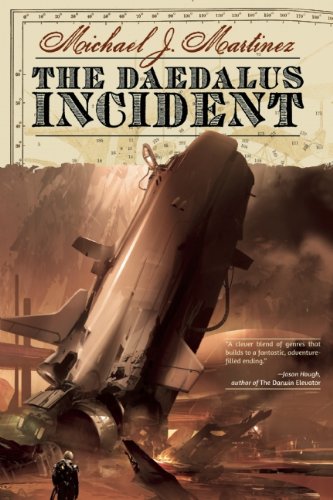The Daedalus Incident by Michael J Martinez
We’re back to the age-old question of what we should be looking for when we read a new book. I suppose we want some degree of novelty or originality. After a while, reading and rereading all the most obvious plots and tropes become boring. So it can break the monotony when someone tries something new. Let’s start off with the solar sail. This used to be quite a common idea to play with. Our space vessel would literally spread its wings and the currents of space would drive the ship forward. Hence, for example, David Weber uses gravitational sails and has “naval engagements” in his Honor Harrington series, while David Drake’s RCN series more explicitly has space ships with rigging that has to be stripped down before the ship can enter an atmosphere. Following in the same tradition, Bob Shaw has wooden spaceships crewed by ragged astronauts in the Land and Overland Trilogy. In Philip Reeve’s Larklight series, the alternate history context is provided by a British Empire now encompassing the solar system with Victorian sailing vessels powered by alchemical engines, cf the Spelljammer gaming universe.
I could go on but you should get the message that one of the two narrative threads in The Daedalus Incident by Michael J Martinez is just channelling Patrick O’Brian and recycling Philip Reeve and the film Treasure Planet (I also note a later form of shipping in a paddle steamer which appears in The Fifth Element). This latest contribution to the trope changes the alternate history context to a British Empire sailing into space using eighteenth century naval ships of the line given breathable air and gravity through alchemy. So literally half this “new” book is a rehash of old plot ideas with eighteenth century British naval life extended to include outer space and the planets which are all habitable with at least two alien species of different levels of technology established on different planets and moons. As with the majority of such space fantasy plots written during the early twentieth century, we even have a pirate ship which ferries the primary antagonist around the solar system. Although some of the detail is quite well worked out, this half of the book is rather tedious and wholly derivative. I might have forgiven the almost total lack of originality if either the plotting had been wildly inventive or the writing intentionally humorous, but the plot has nothing new and it’s written with a completely straight face. It even plays the same game as Ronald W Clark in Queen Victoria’s Bomb in which famous historical characters appear, do their thing for a few pages and take a quick bow. We should be grateful American presidents don’t break off their parochial concerns to start killing vampires.
The second half of the book is set in the twenty-second century on Mars with the Joint Space Command using hard science to move between the planets while commercial interests extract minerals from Mars. The tension between the military and business factions is routine. When there are unprecedented seismic events, the security forces want the mining operations suspended. Not caring how many men may be injured or killed, the hard-nosed capitalists insist on “dig, baby, dig!” Needless to say, the future world of conventional science soon collides with alternate history world of alchemy in a multiverse plot. An alien is trying to break out of an interdimensional prison and breaks down the barriers between our two human-dominated dimensions with entirely predictable results.
It’s possible to pull of such a conflation of different plot elements when the author has wit and verve. Sadly, all this is plodding and predictable. Worse, the fact-checking is deficient with a cricket match overseen by a referee. That’s like having a baseball match mediated by a judge. When Night Shade Books was collapsing financially, it seems to have bought up the rights to some first novels. They are cheap and, in an undiscriminating market, can occasionally hit the jackpot — all authors have to start somewhere. As part of the settlement with creditors and authors, Skyhorse is honouring existing contracts on modified terms. Hence The Daedalus Incident sees the light of day. Hopefully, Skyhorse will soon take a grip of the editorial process and improve the standard of the books it buys. In this I note the complete lack of information on the website under the Night Shade banner. It might gives us all greater confidence if the new owner would communicate with its readership.
A copy of this book was sent to me for review.


Ouch! Sad. Truth is, I can’t remember reading a hard-science/fantastic science (or sci-fi/fantasy) crossover that felt “real.” And you’re right: when you have an unserious premise, the last thing you can afford to do is treat it seriously.
Here’s a curiosity: a Best of the Year list that’s struggling to find any good books. Even the inclusion of Donaldson’s The Last Dark is a little iffy — it should only be read by people who have read and enjoyed the first nine in the series. Cheney’s The Golden City is an urban fantasy and Asher’s The Departure is bloodthirsty and dystopian with less than rounded characters. Bein’s Year of the Demon may be there on merit. And the list includes The Daedalus Incident:
http://reviews.libraryjournal.com/2013/11/best-of/best-books-2013-sffantasy/
I’m obviously far away from the popular taste.
Daedalus showed up on a few “Best of 2013” lists and so I picked it up recently. The science vs. alchemy premise is mildly interesting, if awfully derivative, as you note, but literally nothing happens for the first three quarters of this book. Then we get mystical Saturnians, intersecting dimensions, an ancient, evil, ichor-dripping Martian god, and a Lovecraftian summoning ceremony complete with mumbo-jumbo and arm-waving by Count Cagliostro. And the alternate-history world Martinez creates based on alchemy is utterly bogus. He just tosses in a lot of 18th century historical characters and period literary references and hopes no one will notice that a human civilization based on alchemical principles would look radically different from the one he shows us. The Age of Enlightenment was a reaction against superstition, tradition, and Church dogma, but in this novel they coexist as though not at all antithetical. Fantasy is fine for children’s novels, but this pretends to more, and fails.
When Night Shade first started out in life, it had a better eye for new authors. As you say, this is a failure. Worse, it’s so obvious a failure it should never have seen the light of day.